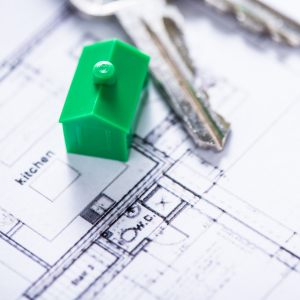
Selling Your Home to a Developer: An Overview
What Does It Mean to Sell to a Developer?

Selling your property to a developer in Massachusetts means giving ownership of your real estate to a company or individual that focuses on property development. Developers look for properties they can turn into new projects, like residential or commercial buildings. Selling to developers differs from regular buyers because developers care more about the land’s potential than the house’s current condition.
Differences Between Selling to Developers and Traditional Buyers
In the Massachusetts real estate market, selling to developers differs from selling to traditional buyers. Regular buyers usually want a place to live, so they care about things like how the house looks inside and out. Developers, however, focus on the property’s location, zoning rules, and development potential. The house sale process with developers can be faster because they often have the money ready and can make a cash offer, speeding up the entire deal.
Why Sell My House to a Developer in Massachusetts?
Advantages of Selling Your Massachusetts House to a Developer

There are several reasons to sell your Massachusetts house to a developer. One significant benefit is the cash offer, which makes the sale process easier and quicker. If your home needs essential repairs, selling to a developer is helpful because they buy based on land value, not the house’s condition. Selling to developers can save you the money and hassle of fixing the home to attract regular buyers.
Factors That Attract Developers to Your Property
Developers search for specific characteristics while selecting a property. In Massachusetts, zoning laws are crucial; places that allow for more construction are particularly tempting. Furthermore, if your house is in a growth area, developers may consider it an excellent investment. Understanding these elements can help you make your property more appealing to developers.
For more information on selling your house to a developer or to discuss your specific situation, consider reaching out to Naples Home Buyers. Our team is ready to assist you with expert advice tailored to your needs. Feel free to comment below or contact us directly for further inquiries.
How to Find the Right Developer for Your Home
Picking the right developer for your home takes some research and thought. Whether you’re working with real estate developers in Massachusetts or selling your property, understanding the steps and qualities of a good partner is essential.

Researching Real Estate Developers in Massachusetts
Before deciding, research real estate developers in Massachusetts thoroughly. Check out Massachusetts housing development projects to find developers specializing in your area. A look at the housing market analysis in Massachusetts can reveal trends and opportunities for redevelopment.
Tips for Research:
- Identify Active Developers: Look for developers involved in current Massachusetts housing projects.
- Review Past Work: Check their past projects for their expertise and success rate.
- Read Reviews: Online reviews can show a developer’s reliability and quality.
Evaluating Developer Reputation and Past Projects
Knowing a developer’s reputation helps ensure success. Start by looking at their past projects, especially those with Massachusetts residential developments, to see their work style and results.
Key Considerations:
- Reputation in the Industry: Verify through testimonials and industry references.
- Quality of Past Projects: If you can, visit finished projects in person to see how well the developers completed them.
- Negotiation History: Learn how well they negotiate, especially in Massachusetts.
Questions to Ask Before Choosing a Developer
To choose wisely, prepare questions that cover key points of developer selection. Consulting a Massachusetts real estate attorney can help with negotiation and contract details.
Essential Questions:
- What kind of experience do you have with projects like this before?
- Can you provide references from past clients?
- How do you handle contract negotiations and changes?
Preparing Your Home for Sale to a Developer
When selling your home to a developer, follow a step-by-step approach. A thorough home inspection in Massachusetts will find any issues to fix before selling.

Steps to Ready Your House for Developer Interest
Making your home appealing to developers requires several steps. Begin by assessing your home’s current market value and ensuring it’s ready for inspections.
Preparation Steps:
- Declutter and Clean: Remove personal items to create a neutral space.
- Professional Inspection: Schedule inspections to address potential issues early.
- Enhance Curb Appeal: Simple landscaping can attract developer interest.
Should You Make Repairs Before Selling to a Developer?
Several factors influence deciding on repairs before selling. Consider whether selling as-is works for you or if the cost of repairs in Massachusetts justifies a higher sale price.
Considerations:
- Property Condition: Determine any necessary repairs that could impact the sale.
- Cost-Benefit Analysis: Determine whether repair costs will lead to higher offers.
- Market Expectations: Know what developers expect regarding property conditions.
Finding the right developer and preparing your home involves careful research, asking the right questions, and deciding on repairs. Following these steps increases your chances of a successful and profitable sale. If you have more questions, contact us at Naples Home Buyers.
Negotiating with Developers: Key Strategies
Negotiating with developers in Massachusetts can be challenging, especially if you’re selling your home. However, by employing the appropriate tactics, you may ensure that you receive a fair offer. Here’s what you should know.

Understanding the Offer Process with Developers
When you get a cash offer from a developer in Massachusetts, it’s essential to understand what’s behind it. Developers might approach you as part of larger Massachusetts housing development projects, which can affect their offer. Evaluate the fairness of the offer by examining the current real estate market in Massachusetts. Consider contacting Massachusetts property developers for additional information before making a decision. Selling to a developer offers advantages, including the potential for a more expedited sale and a reduction in conditions.
How to Negotiate Terms Favorably
To successfully negotiate the home sale price in Massachusetts, you must prepare and think strategically. Start by looking up tips on selling Massachusetts homes to learn about the local market. If you’re considering selling your property for redevelopment, look at developers’ offers closely. Talking to a Massachusetts real estate attorney to handle legal matters is wise.
Common Pitfalls to Avoid When Dealing with Developers
There are several common pitfalls when negotiating with developers. A considerable risk is accepting an initial offer without fully understanding it. To avoid mistakes, communicate clearly with real estate developers in Massachusetts and check Massachusetts property developer contacts. Being informed helps you avoid problems later on.
Legal Aspects of Selling to a Developer
Knowing the legal aspects of selling your property to a developer in Massachusetts is very important. Talking to a real estate attorney in Massachusetts can be helpful if you have any queries about the law regarding selling your home. To ensure that you are protected, it is essential to thoroughly review any contracts and agreements that you have entered into. Therefore, you need to be aware of the documentation involved in the sale of property in Massachusetts because selling property in its current condition can have repercussions.

Importance of a Real Estate Attorney
Hiring a Massachusetts real estate attorney is vital for help during a property sale. A knowledgeable attorney can guide you through real estate law in Massachusetts and ensure all documents meet state rules. This legal support is invaluable when dealing with selling a home.
Reviewing Contracts and Agreements Carefully
Reviewing contracts in Massachusetts needs careful attention. Legal reviews in a home sale can prevent misunderstandings and protect your interests. Focus on home sale agreements in Massachusetts and ensure you understand developer contracts completely. Having a legal expert look at these documents can help avoid costly errors.
Please get in touch with us for more details about selling your home to a developer in Massachusetts or to discuss how Naples Home Buyers can help you. We welcome your comments and are here to provide personalized assistance.
Financial Considerations When Selling to a Developer
When selling your Massachusetts home or property to a developer, you should consider a few financial factors. Knowing these can help you make smart choices and ensure the sale goes smoothly.

Impact on Your Taxes from Selling to a Developer
Selling your property to a developer in Massachusetts can affect your taxes. You should know the tax implications of such a sale. The IRS may treat your profits as capital gains, which might be taxed based on how long you’ve owned the property and your overall financial status.
Consider these tax-related points:
- Capital Gains Tax: If you sell your property for more than what you paid, the difference could be subject to capital gains tax. Long-term gains (for properties over a year) are usually taxed lower.
- Deductions and Exemptions: Some deductions, like those for home improvements, can lower your taxable gains. If you meet specific criteria, the IRS provides exclusions on capital gains for primary residences.
- Tax Planning: Plan your taxes carefully to minimize liabilities. Consulting a tax professional familiar with Massachusetts tax laws can give you tailored advice.
How to Handle Any Outstanding Mortgages or Liens
Taking care of outstanding mortgages or liens is vital when selling your property to a developer. You need to resolve these financial obligations before finalizing the sale.
Consider these steps:
- Identify Outstanding Debts: Examine your mortgage accounts and title for any mortgages or liens against your property.
- Payoff Estimation: Contact your lender for a payoff statement showing the exact amount needed to clear your debt.
- Resolving Liens: To settle any liens, consult a title firm or a real estate attorney. Some liens may need to be negotiated or settled before removal.
- Include in the Sale Process: Inform the developer about any outstanding debts. Developers often handle properties with existing financial obligations.
Timing Your Sale to a Developer
Choosing the right time to sell your property to a Massachusetts developer can significantly impact your sale’s success. Market conditions, seasonal trends, and strategic timing can all influence your outcome.

Best Time of Year to Sell to a Developer in Massachusetts
Finding the best time of year to sell can help maximize your property’s value. In Massachusetts, certain seasons offer better market conditions due to different levels of buyer interest and developer activity.
- Spring and Summer: These seasons often have increased activity in the real estate market. Developers usually want to buy properties during this time because of favorable weather for construction.
- Market Opportunity: Analyzing local real estate trends can show optimal times for high demand, possibly leading to better developer offers.
- Planning Ahead: Early planning can position your property well as the market heats up.
How Local Market Trends Can Affect Your Sale Timing
Local market trends play a significant role in deciding when to sell your property. Understanding these trends helps you match your strategy with market demands.
Factors to think about include:
- Supply and Demand: High demand with limited supply in your area can lead to more competitive offers.
- Economic Indicators: Watch Massachusetts’s financial conditions and real estate forecasts to predict market changes.
- Developer Interest: Notice areas where developers actively seek projects. Increased interest can indicate rising demand and potential for a profitable sale.
Selling to a developer involves understanding financial implications and strategic timing. Addressing tax considerations and resolving outstanding debts can secure a smoother transaction. Timing your sale with market trends increases the value of your property.
For personalized help or more info on selling your property, contact Naples Home Buyers. We guide you through every step of the process.
Beyond the Sale: What Comes Next?
Selling your home is a big step, but it starts a new chapter. Here’s how you can manage what happens next to make life smoother.

Moving
After selling, moving is the first task on your list. Make a checklist for sorting your stuff, packing, hiring movers, and changing your address. Staying organized helps keep things easy and stress-free.
Transition Planning
Getting ready for life after selling involves more than just the move. Consider how your life might change in a new place or community. Decide if you want to downsize, relocate, or rent while you figure out the next steps. Planning will help you handle these changes well.
Alternative Housing Options
Explore where you might live next. You could buy a smaller house, rent a condo, or consider community living that fits your lifestyle. After the sale, looking at different housing options helps you find the right fit for your plans.
Insights from Successful Sales
Learning from others’ experiences can help you plan your successful sale. Look at what homeowners and developers have done to see what works.

Case Studies
Real-world examples teach valuable lessons. Some homeowners get better results by timing their sales correctly, and others succeed with unique negotiation techniques with developers.
Lessons Learned from Homeowners and Developers
Both homeowners and developers agree that preparation and flexibility are key in real estate deals. Seeing how they tackled challenges helps you make smart choices and plan for a successful sale.
Focusing on these aspects and learning from past successes can help you confidently move forward after the sale. Make sure your next steps match your personal and financial goals. At Naples Home Buyers, we support you throughout this exciting time. Reach out if you have questions or need help planning your next move.
FAQs:
How can I prepare my home for sale to a developer in Massachusetts?
To prepare your home for sale, check its condition and make any needed repairs or upgrades. A well-maintained property can make it more attractive to developers looking to buy. Getting a property appraisal will help you know your home’s value. Talking to a real estate attorney about Massachusetts’ zoning rules and legal requirements might also be helpful.
What are the benefits of selling my property to a developer in Massachusetts?
Selling to a developer often comes with benefits like quick cash offers and fewer conditions than typical buyers. Developers usually look for properties to redevelop, which can lead to faster deals. This option is good if you want to sell quickly without doing a lot of repairs or renovations.
How do I find the right developer for my property sale in Massachusetts?
Start by looking for local developers who have worked on housing projects in Massachusetts. You can also contact real estate professionals, who often have connections with potential buyers. Checking with Massachusetts property developer contacts and real estate investment groups can give you leads on trustworthy developers interested in your area.
What should I consider about the tax implications of selling to a developer?
Selling property in Massachusetts can significantly affect taxes. Talking to a tax advisor is essential to understanding capital gains taxes and other possible costs. Careful budgeting will help you plan and avoid unexpected expenses during the sale process.
How do negotiations with developers typically work?
Negotiating with developers means understanding their needs and what makes your property unique. Be ready to discuss the price, the sale’s close, and specific conditions. Knowing your minimum acceptable terms will help you reach a reasonable agreement.
Is it possible to sell my Massachusetts property as-is to a developer?
Many developers like buying properties as-is, especially if they plan to redevelop the land. A thorough inspection can save you from having to make expensive repairs. However, it’s essential to be clear about the property’s current state during negotiations to avoid misunderstandings.
What role does a real estate professional play in selling to a developer?
A good real estate professional can help with the selling process by offering market insights, setting up meetings with developers, and handling paperwork. They can also advise on pricing strategies and help negotiate better terms, ensuring you get a fair deal.
How does the timing of selling to a developer affect the process?
Timing can significantly impact the success of the sale. Understanding Massachusetts property market trends and knowing when developers are looking for new projects can help speed up your sales. Consulting with an experienced real estate professional can give you valuable advice on timing your sale for the best results.
Key Insights
- Learn how to sell your property in Massachusetts by understanding the process and effectively negotiating with developers.
- We guide you through the sale process in Massachusetts, including handling tax implications and property appraisal.
- Explore the advantages of selling to a developer and learn how to approach the Massachusetts real estate market confidently.
- Gain insights into Massachusetts housing development projects and find real estate developers that meet your needs.
- Understand Massachusetts zoning regulations and their impact on selling your house for redevelopment or land sales.
- Get expert advice on the Massachusetts home closing process, covering mortgage payoff and preparing your house for sale.
- Consider the pros and cons of a cash offer from a developer and learn about the Massachusetts housing market analysis.
- Follow the steps for a quick home sale in Massachusetts by engaging listing home buyers and completing the required paperwork efficiently.
- Our expertise helps you sell your Massachusetts property as-is, with tips on home inspections and seller disclosures.
- Contact us for more help and personalized advice to discuss your options and simplify your home-selling experience.
These details apply to the entire state of Massachusetts, including cities like Springfield, Amherst, Greenfield, Huntington, and Hadley, as well as their surrounding areas. If you require extra assistance or have particular inquiries, please contact us at (413) 331-6060. Please see our website, Naples Home Buyers, for more information and complete descriptions of our services.


